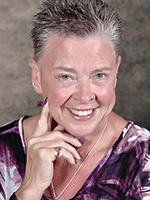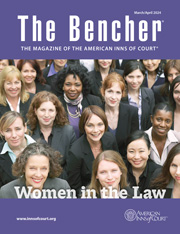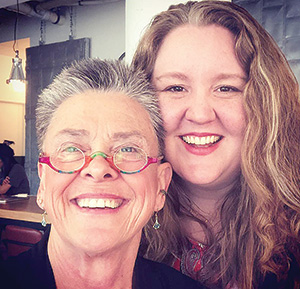Carol Fey, Esquire: An LGBTQIA+ Legal Trailblazer
The Bencher | March/April 2024
By Hannah Botkin-Doty, Esquire

 When I was a burgeoning law student in Columbus, Ohio, still capable of all-nighters, and still dreaming desperate dreams of my future legal career, I was introduced to Carol Fey, Esquire, at a Stonewall Columbus event discussing the same-sex marriage cases that were working their way up to the U.S. Supreme Court.
When I was a burgeoning law student in Columbus, Ohio, still capable of all-nighters, and still dreaming desperate dreams of my future legal career, I was introduced to Carol Fey, Esquire, at a Stonewall Columbus event discussing the same-sex marriage cases that were working their way up to the U.S. Supreme Court.
Fey appeared to me to be the kind of attorney I wanted to be: informed, confident, willing to work toward a more inclusive and equal future, and an unrelenting advocate for what is right, not necessarily what is popular.
Fey was discussing an ongoing case in which she represented a lesbian mother who had a child with her spouse but was not genetically related to the child. The biological mother was now successfully using the conservative court system to deny and distance Fey’s client from her child.
While listening to her story, I understood that Fey was fighting an uphill battle, but it was just as clear that she had no intention of surrender. After her panel, when I approached her to ask about some of her experiences, we had a brief but meaningful exchange in which she encouraged me to keep fighting the law school grind and come out swinging to protect those that needed the support.
Spoiler: Carol won her case, the first time a shared custody agreement had been issued to a non-biological mother over a biological mother’s objection. This victory laid the groundwork for the Ohio Supreme Court’s affirmation of that practice. In honor of that work, Fey was awarded the Stoney Award by Stonewall Columbus Union.
In later years I would find Fey by the sound of her laugh at various bar association functions or in the county courthouse. Her booming laugh always lifted my spirits in a sometimes-devastating world that family law practice can be. Even then, I found her to be an inspiration from afar. She represented a finish line for me, someone who had “made it” and was well-respected by her colleagues, her clients, and the courts—everything I was striving to become.
After years of practice, one day I was reviewing my daily onslaught of emails when I saw a notice chime in from the clerk of courts that made my heart skip a beat. Fey had filed a Notice of Appearance as the opposing counsel in my lesbian divorce case. After the initial shock and awe that I was somehow playing in the same legal sandbox as my icon, I was quickly reminded that this was not a theoretical exercise when I received her discovery requests. I pulled myself up by my bootstraps and prepared to show her, the court, and myself that I too was a force and a fighter.
For the first time, at the next hearing, I met not Carol the Mentor, but Carol the Advocate. Had her eyes always been that piercing blue-gray as they peered at me in silence over her half-moon reading glasses? What happened to all the air in the conference room after I made an opening offer on behalf of my client?
Turns out that Fey was even more multifaceted than I had already given her significant credit for. Eventually after several motions, emails, and hearings, the case ended as domestic cases often do, with a settlement.
Once the final documents were filed and the clients’ cases were closed, I sought out Fey again, not for a post-mortem of the case or a review of my work, but more to assure myself that my mentor and friend were still there. We spent time together over lunch laughing and lingering over small plates, as once again I found myself with Carol the Kind and left that day encouraged to continue the good fight.
Many years later, I was trying to find balance by joining a small local firm in the hopes that more staff and colleagues around me would help right my ship that was slowly sinking in burnout after six years of practice.
About a month after I joined the firm, I was brought into the managing partner’s office and told that they were considering an offer from Carol Fey to come work at the firm as “of counsel.” They were concerned that I may be upset by the notion of another attorney with the same practice area as me. On the contrary, I was delighted to finally have another woman at the firm that wasn’t a receptionist, and having Fey down the hall would be a boon for me. In the sometimes very cutthroat and “eat what you kill” world of law, this was not a competitor, but a collaborator. It was during this year that my respect and admiration for Fey only grew, and I also came to truly love her as a person and surrogate mother.
Fey, who is a member of Temple Beth Shalom, where she also plays piano, told me about her family motto, “Beshert.” It is essentially a Yiddish term for “meant to be.” She taught me that what is meant for you is coming to you no matter what you do or try to avoid.
Fey taught me to be comfortable in my own skin and use my confidence to provide support to our clients going through their own difficulties. She extolled me to try to find a way to enjoy my work, to find the joy in the valleys, and claim each mountaintop with humble pride in a job well done.
 Fey has left a legacy in my heart and in the hearts and lives of her many clients, colleagues, and friends. After close to 40 years of legal practice, she now spends a significant amount of her time enjoying a partial retirement with her wife, Joan Wurmbrand, MD, both in Ohio and Florida. But Fey always makes time for a call or a laugh and still inspires me to bring my full self to the fore when advocating on behalf of myself and my clients.
Fey has left a legacy in my heart and in the hearts and lives of her many clients, colleagues, and friends. After close to 40 years of legal practice, she now spends a significant amount of her time enjoying a partial retirement with her wife, Joan Wurmbrand, MD, both in Ohio and Florida. But Fey always makes time for a call or a laugh and still inspires me to bring my full self to the fore when advocating on behalf of myself and my clients.
Thank you, Carol, for all that you are, and all that you do. Happy Women’s History Month.
Hannah Botkin-Doty, Esquire, is the founder of Hannah’s Legal Help and focuses her legal practice on serving the LGBTQIA+ Community in Central Ohio. With more than a decade of experience, Hannah also advocates for the rights and needs of her community by writing articles, leading continuing legal education sessions, and contributing to various boards and committees across Ohio. She is a member of the Chief Justice Thomas J. Moyer American Inn of Court in Columbus, Ohio.